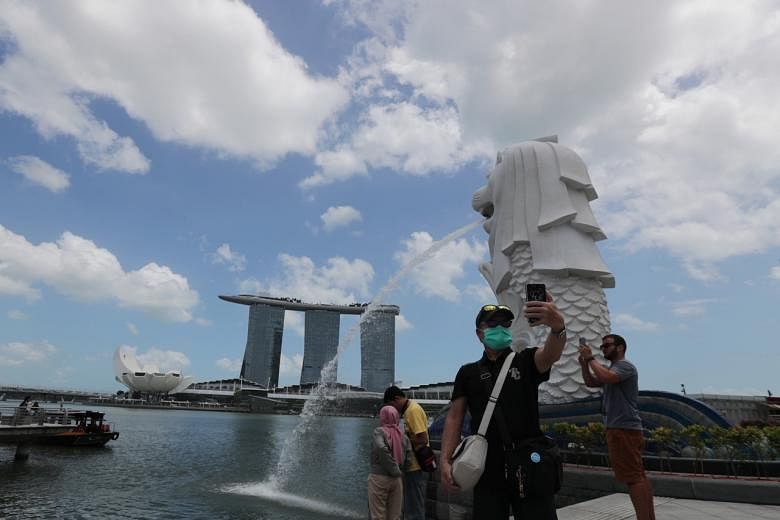Singapore will draw down more of its reserves than it has ever done, and incur an unprecedented Budget deficit this year, as the country fights the financial impact of the coronavirus that has battered the economy.
For the second time in the nation's history, the Government will dip into past accumulated savings. But the $17 billion it plans to use this time is more than three times the amount drawn down for the global financial crisis.
The measures announced by Deputy Prime Minister Heng Swee Keat yesterday to save jobs, rescue entire industries and help Singaporeans tide over the storm will also bring this year's Budget deficit to a record $39.2 billion.
Setting out the considerations behind the unprecedented economic measures, Mr Heng, who is also Finance Minister, described the pandemic as the kind of "black swan" event that is precisely what the reserves were saved up for.
"We have saved up for a rainy day. The Covid-19 pandemic is already a mighty storm and it is still growing," he said. "Unlike the global financial crisis or the Asian financial crisis, where both the causes and solutions were economic and financial in nature, this crisis is far more complex, with additional medical, social and psychological dimensions."
As nations shut their borders, limit exports and halt economic activities to fight the spread of the virus and save lives, the economy has suffered a deep shock.
Already, the Ministry of Trade and Industry has forecast a sharp contraction, downgrading the growth estimate to a range of minus 4 per cent to minus 1 per cent, from an earlier estimate of minus 0.5 per cent to 1.5 per cent.
This is not an event that could have been anticipated and dealt with using revenues collected by each term of government, said Mr Heng, and so President Halimah Yacob's in-principle support was sought to unlock the reserves.
He added that she has given her in-principle support and he is prepared to propose dipping further into the savings should the situation worsen and warrant it.
The $17 billion will fund part of the $48 billion supplementary budget unveiled in yesterday's special Parliament sitting.
About $13.75 billion of it will be used to pay for measures to give greater job support, while the rest will help those who are self-employed, the aviation sector, as well as to provide financing to firms.
With all this spending, the deficit will come up to 7.9 per cent of gross domestic product, but Singapore can still remain fiscally sustainable because of the discipline and prudence in husbanding the reserves over many years, said Mr Heng.
Government leaders have reminded Singaporeans time and again of the importance of the strategic asset and Mr Heng reiterated that the reserves serve as a bulwark against crisis of an extraordinary nature, of which the current pandemic more than qualifies.
Having saved for a rainy day and created a two-key system to protect the money from misuse, the Government now has the wherewithal to respond decisively, he added.
"For a nation with no oil, no gas, no gold, no diamonds or natural resources of any kind, it is remarkable that we have built this up," he said.
He noted that the Government had resisted political pressure and ignored many calls in the past to dip into the piggy bank, and scrupulously upheld the principle to use it only in exceptional situations.
The only other time it has asked for permission to use the reserves was during the global financial crisis, when it was given approval to draw down $4.9 billion, but used only $4 billion to save jobs in 2009. The money was promptly returned to the reserves in 2011, after the economy turned around.
In 2008, a sum of $150 billion was pledged to guarantee bank deposits in Singapore up to 2010. It marked the first time the Government called on the President to exercise the head of state's custodial powers over the reserves, but the guarantee was never triggered, said Mr Heng.
"If over the years we had frittered the reserves away on more immediate but less existential needs, big and small, as some in this House have pressed the Government to do, we would be in a much weaker position today," he added. "I trust that every member of this House will deeply internalise the mission to be careful stewards of our reserves."
With the increased expenditure and the bleak global outlook, Singapore's fiscal position will be affected, he warned. And this time, the country cannot hope to rely on a repeat of the unexpected revenue upsides in the past few years, such as the exceptional contributions from increased stamp duty, he said.
"Instead, we must be prepared to bear the downsides when they happen. Because we have been prudent and did not decide to spend all of the surplus that we collected, we are ready to meet such downsides."
He said the situation remains highly fluid and uncertain, and urged those who receive help to use the resources wisely.
"We will use our resources to get through this together," he added.












